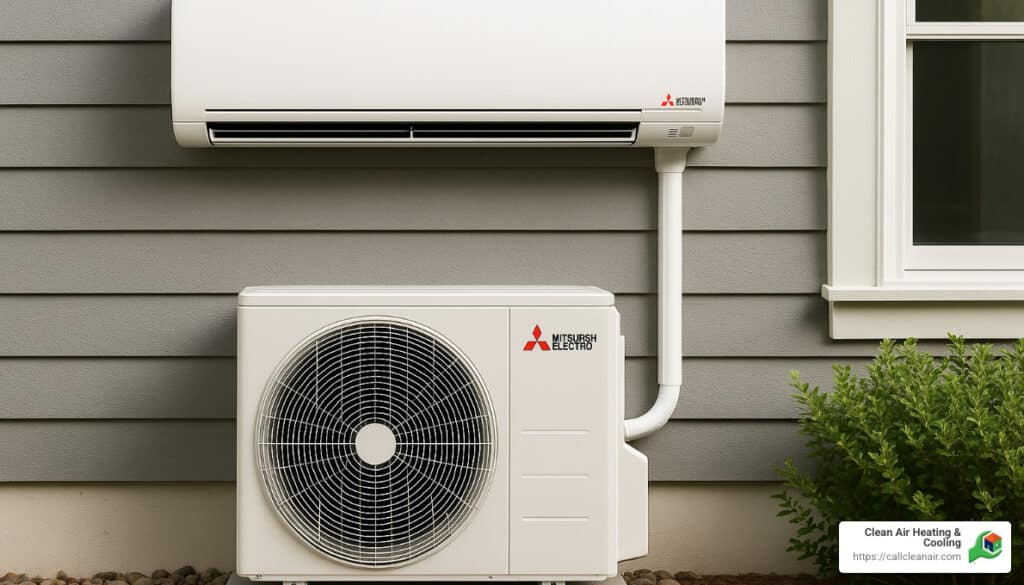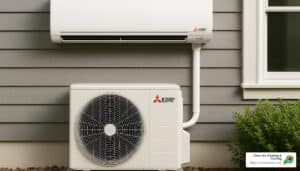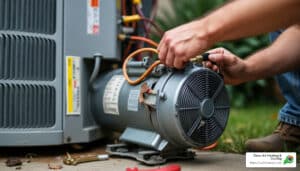Why the Mitsubishi 12000 BTU Mini Split Price Matters
mitsubishi 12000 btu mini split price typically ranges between:
- Standard models: $1,600 – $3,200
- High-efficiency Hyper Heat models: $3,000 – $4,500+
- Installation costs: add around $1,000 – $2,500 depending on complexity
When planning your home’s comfort system, comparing prices for Mitsubishi’s 12,000 BTU mini splits isn’t just about budgeting—it’s about getting real long-term value. Prices vary significantly based on models, efficiency ratings (SEER), special features, and your specific home’s installation needs.
I’m Colin Matei. Over the years, leading Clean Air Heating & Cooling in Bellingham, I’ve helped many homeowners understand the practical impact of the mitsubishi 12000 btu mini split price on their comfort and energy savings.
Here’s a visual overview to quickly show what drives mini split pricing:
Understanding Mitsubishi 12,000 BTU Mini Split Prices
When you’re thinking about the mitsubishi 12000 btu mini split price, it helps to first understand what makes this particular system such a popular choice. A 12,000 BTU mini split is just right for a typical bedroom, a cozy home office, or a smaller living area around 400 to 600 square feet. Here in Northwest Washington, this sizing hits a sweet spot for homeowners who prefer efficient, room-by-room comfort control.
Of course, Mitsubishi has built a strong reputation for reliability, quality, and efficiency—and that comes at a variety of price points. So, let’s take a friendly walk through what exactly influences the price you’ll see when shopping for these handy heating and cooling systems.
On average, the mitsubishi 12000 btu mini split price ranges from about $1,600 up to more than $4,500, depending on the model and features you choose. Several key factors determine where your ideal unit falls within this range.
One big factor is the SEER rating (Seasonal Energy Efficiency Ratio). Think of SEER like the miles-per-gallon rating for cars: the higher the number, the more efficient—and usually higher-priced—the system. Mitsubishi mini splits start at around 16 SEER and climb all the way up to an impressive 26.1 SEER in their premium models.
Another important element is the type of heating technology in your mini split. Mitsubishi offers standard heat pumps that work well in moderate climates, but they also provide advanced Hyper Heat models that really shine during Bellingham’s chilly winters. Naturally, Hyper Heat models come with a higher price tag due to their specialized engineering and ability to heat homes even in sub-freezing temperatures.
You’ll also notice price variations across different Mitsubishi product lines or series. For instance, the entry-level JP series offers quality basics at a lower cost, while the mid-range GL series adds a few extra convenience features. Move up to the premium FS and FH series, and you’ll find advanced features like improved filtration, quiet operation, and Wi-Fi connectivity—and yes, this leads to a higher initial investment.
Warranty coverage and installation complexity also significantly affect the final cost. Standard warranties offer basic protection, but opting for extended coverage can add to the total price. Likewise, a simple installation might run around $1,000, while more complicated scenarios—like tricky wiring or specific mounting requirements in some Whatcom, Skagit, or Snohomish county homes—can easily approach or exceed $2,500.
In other words, a straightforward Mitsubishi mini split with standard features will generally cost less than premium models equipped with Hyper Heat technology, advanced filtration, and smart home compatibility. It’s all about balancing your comfort goals with your budget.
How SEER Ratings Impact Mitsubishi 12,000 BTU Mini Split Price
When you start comparing the mitsubishi 12000 btu mini split price, one term you’ll often come across is SEER, or Seasonal Energy Efficiency Ratio. SEER measures how efficiently your mini split cools your home—essentially, how much bang for your buck you get when using electricity. To use a familiar analogy, it’s similar to comparing the fuel efficiency ratings of different cars: a higher SEER number means greater efficiency and lower energy bills over the long run.
Mitsubishi mini splits range from about 16 SEER for entry-level models to 26.1 SEER for top-of-the-line systems. This range directly affects pricing. For instance, entry-level units (about 16-18 SEER) tend to be the lowest-priced options. Mid-range models (approximately 20-22 SEER) bump up slightly in price but offer a solid compromise between initial cost and long-term savings. Finally, premium units (around 23-26+ SEER) typically cost the most upfront but deliver substantial energy savings for many years.
To put this into perspective: according to energy efficiency experts, a 20 SEER unit uses around half the energy of an older 10 SEER model. Given the rising energy costs in Bellingham and throughout Northwest Washington, investing in a higher-SEER unit often pays off big-time over a decade or more of use.
For homeowners here in Whatcom, Skagit, and Snohomish counties, we routinely recommend looking at more than just the initial price. Often, it makes sense to invest a little more upfront on a higher SEER Mitsubishi mini split that can save you substantially on monthly utility bills down the line. For a deeper dive into energy efficiency specifics, check out our Mini Split Cooling Efficiency guide.
Standard vs. Hyper Heat Models: Mitsubishi 12,000 BTU Mini Split Price Differences
Another critical consideration when looking at the mitsubishi 12000 btu mini split price is whether to go with a standard heat pump or Mitsubishi’s specialized Hyper Heat models (H2i). Here in Northwest Washington, where winter temperatures frequently dip below freezing, this difference matters—a lot.
Standard heat pump models are great for mild climates or occasional heating needs. They’re usually lower-priced, making them a budget-friendly option. But here’s the catch: once outdoor temperatures drop below around 40°F, standard heat pumps gradually lose their heating capacity. They’re still useful, but might need backup heating on colder days.
On the other hand, Mitsubishi’s Hyper Heat (H2i) models keep humming along even when temperatures plummet. These specialty units provide full heating capacity down to -5°F, and they still deliver around 70-81% of their heating power even at -13°F—perfect for chilly Bellingham winters.
Hyper Heat models include advanced technology and extra components specifically designed to withstand harsh cold conditions. Of course, that added capability comes at an increased cost, typically around 15-30% more expensive than standard heat pump options.
For instance, a Mitsubishi Hyper Heat model like the MUZ-FS12NAH is specifically designed to handle our region’s colder weather. Its advanced performance and reliability in freezing temperatures justify its higher upfront cost, especially if you plan to rely on your mini split as your main source of heat during winter.
In short, while the Hyper Heat model adds to your initial investment, it often pays for itself quickly by eliminating the need for supplemental heating solutions—making it a smart move for homeowners in Whatcom, Skagit, Snohomish, and San Juan counties.
Comparing Mitsubishi Mini Split Series and Their Prices
When I talk with homeowners about mitsubishi 12000 btu mini split price options, I often see their eyes widen at the variety of choices. It’s not just about picking any 12,000 BTU unit—Mitsubishi offers several distinct product lines, each designed for different needs and budgets.
Let’s walk through the main Mitsubishi series you’ll encounter when shopping for a 12,000 BTU mini split:
| Series | SEER Rating | Key Features | Best For | Relative Price |
|---|---|---|---|---|
| JP Series | 17-18 SEER | Basic functionality, 115V operation, standard heating | Budget-conscious buyers, supplemental cooling, mild climates | $ |
| GL Series | 20-21 SEER | Improved efficiency, multiple fan speeds, basic filtration | Year-round use in moderate climates, energy-conscious buyers | $$ |
| FS Series | 26.1 SEER | High-efficiency, advanced filtration, available with Hyper Heat | Primary heating/cooling in variable climates, premium comfort | $$$ |
| FH Series | 25+ SEER | Premium features, i-see Sensor, advanced control options, Hyper Heat | Luxury applications, tech-savvy users, extreme climate regions | $$$$ |
The FS series has become a favorite among our Bellingham customers. Models like the MSZ-FS12NA strike that sweet spot between high performance and reasonable cost. With an impressive 26.1 SEER rating, these units can significantly cut energy bills while handling our Northwest Washington weather patterns beautifully.
For those willing to invest a bit more, the FH series offers some truly remarkable technology. Its i-see Sensor actually scans the room and adjusts airflow based on where people are sitting and what the temperature conditions are in different parts of the room. Yes, it bumps up the mitsubishi 12000 btu mini split price, but for many of our customers, the improved comfort is worth every penny.
On the more budget-friendly end, I’ve installed plenty of JP and GL series units in milder areas around Skagit or Island County. The JP series even runs on standard 115V power, which can make installation simpler and less expensive in some homes—a nice bonus for vacation cabins or smaller spaces.
When helping you choose between these options, we focus on three things: your comfort needs, your budget constraints, and the specific characteristics of your home. There’s no one-size-fits-all answer, which is why we take the time to understand exactly what you’re looking for.
What’s Included in the Base Price of a Mitsubishi 12,000 BTU Mini Split?
When you see a mitsubishi 12000 btu mini split price advertised, you might wonder what exactly that includes. The base package typically comes with the essential components you need, but understanding what’s included helps you compare apples to apples when shopping around.
Standard components in the base price typically include your outdoor condenser unit (like the MUZ-FS12NA) and the indoor wall-mounted air handler (such as the MSZ-FS12NA). You’ll also get basic mounting hardware for the indoor unit, a wireless remote control for everyday operation, the standard manufacturer’s warranty (usually 5-7 years on parts and 7 years on the compressor), plus the owner’s manual and installation instructions.
What’s typically not included might surprise you. The line sets (those copper pipes that connect the indoor and outdoor units) are often sold separately. You’ll also likely need to purchase condensate drain components, a mounting pad or bracket for the outdoor unit, and an electrical disconnect box.
Advanced control systems like the kumo cloud® Wi-Fi controllers are usually extra, as are extended warranty options. And of course, professional installation is almost always separate from the equipment price.
I’ve had customers call me confused about why one vendor’s price seemed so much lower than another’s. When we dug into the details, it turned out one quote included the line set, mounting hardware, and other necessities, while the “cheaper” option didn’t include any of those must-haves. By the time everything was added up, the supposedly less expensive option actually cost more!
Here’s a pro tip: Mitsubishi offers an opportunity to upgrade the standard warranty to a 10-year parts and compressor warranty when you register your unit online and have it installed by qualified professionals like our team. This extended coverage adds tremendous value to your investment and peace of mind for years to come.
Additional Costs: Installation and Accessories
Beyond the base mitsubishi 12000 btu mini split price, there are several additional costs to consider when budgeting for your new system. Installation and accessories can add significantly to your investment, but they’re essential for getting the performance and reliability you’re paying for.
Professional Installation
I can’t stress enough how important proper installation is. I’ve seen DIY installations lead to refrigerant leaks, water damage, and even voided warranties. For homes throughout Whatcom, Skagit, Snohomish, and San Juan Counties, professional installation typically includes:
The labor itself usually takes between 4-8 hours depending on complexity. We’ll handle the line set installation and charge the system with the proper amount of refrigerant. We take care of all electrical connections and permits, mount both the indoor and outdoor units securely, run the condensate drain properly, and thoroughly test the system before we consider the job complete.
Certain factors can make installation more complex—and therefore more expensive. If we need to run line sets a long distance or through challenging areas of your home, that takes more time and materials. Difficult access points, like second-story installations or tight crawl spaces, require extra labor. Some homes need special mounting solutions or electrical service upgrades. And sometimes the condensate drainage situation requires additional work to ensure water flows away properly.
Accessories That Complete Your System
Beyond installation, several accessories might be necessary or desirable for your specific situation. Line sets typically cost between $50-$200 depending on the length needed. If gravity drainage isn’t possible in your installation location, you might need a condensate pump ($100-$200).
For outdoor units, wall mounting brackets ($75-$200) keep your system secure and off the ground, while equipment pads ($50-$100) provide a stable base for ground-mounted units. Many homeowners opt for line set covers ($50-$150) to improve the appearance of exterior line sets.
Smart home enthusiasts often add Wi-Fi controls ($200-$300) for smartphone operation and integration with other home systems. And I always recommend surge protectors ($100-$200) to safeguard your investment from power fluctuations—especially in areas with less reliable electrical service.
At Clean Air Heating & Cooling, we provide detailed quotations that include all necessary components and installation costs upfront. We believe in transparent pricing that helps you understand exactly what you’re getting beyond the basic mitsubishi 12000 btu mini split price. No surprises, no hidden fees—just honest advice about what your particular installation requires.
For more detailed information about proper installation practices, check out our resource on Mini Split Installation Tips. It covers many of the technical aspects that ensure your system will run efficiently and reliably for years to come.
Seasonal Promotions and Financing Options
When it comes to the mitsubishi 12000 btu mini split price, timing really can be everything. Believe it or not, prices for Mitsubishi mini splits fluctuate throughout the year, so knowing when to shop can help you score a great deal.
Typically, spring (March to May) brings some of the best manufacturer rebates and promotions. As temperatures warm up, Mitsubishi and other manufacturers often roll out special deals to encourage homeowners to upgrade before the busy summer cooling season. On the flip side, fall (September to November) can also offer excellent end-of-season discounts as companies look to clear inventory before cooler weather arrives.
Winter months (December through February) might present savings opportunities for cooling-focused mini splits, while the height of summer (June to August) usually sees fewer promotions due to higher demand. For our customers in Bellingham and throughout Whatcom, Skagit, Snohomish, and San Juan Counties, spring and fall usually offer the ideal mix of promotions, availability, and convenient scheduling.
Aside from seasonal timing, rebates and incentives can also significantly lower your final mitsubishi 12000 btu mini split price. Mitsubishi itself periodically offers rebates, often ranging from $100 to $500, depending on the model. Additionally, local utilities in our area frequently provide incentives for installing high-efficiency heat pump systems—another easy way to keep more cash in your pocket.
Don’t overlook federal tax credits, either. Investing in an energy-efficient HVAC system can qualify you for tax savings, helping offset your initial cost. Special regional programs may also be available—for instance, Seattle residents replacing oil furnaces with modern heat pumps can sometimes access rebates of up to $2,000.
Of course, not everyone has the full amount handy, and that’s completely understandable (mini splits aren’t exactly impulse buys like a candy bar at checkout!). Thankfully, financing options can help spread out your mitsubishi 12000 btu mini split price comfortably over time.
At Clean Air Heating & Cooling, we offer easy, flexible financing solutions with competitive rates designed to fit your budget. Manufacturer financing through Mitsubishi’s dealer network occasionally becomes available too, offering additional convenience and potentially favorable terms.
Homeowners can also consider general home improvement loans or tapping into home equity options like loans or credit lines, often available at lower interest rates. Don’t forget credit card promotions that provide extended 0% interest periods—these can be handy for larger purchases if you pay off the balance before interest kicks in.
Here’s a quick overview of typical financing choices available:
- Manufacturer-sponsored financing
- Contractor-provided options (like those we offer at Clean Air Heating & Cooling)
- Home improvement loans
- Home equity credit options
- Credit card 0% interest promotions
One interesting tip: Some retailers offer e-check payments, which could save you around 2% on your purchase. However, this method usually adds about five business days to processing your order—so if you’re in a hurry, keep the trade-off in mind.
At Clean Air Heating & Cooling, we believe the right financing solution should make your investment easier, not more complicated. Our goal is to ensure the long-term energy savings from your Mitsubishi mini split aren’t outweighed by financing costs.
With the right timing, rebates, and smart financing choices, you can turn your Mitsubishi mini split investment into a comfortable home—with comfortable monthly payments.
Long-Term Value: Investing in Higher-Efficiency Models
When looking at the mitsubishi 12000 btu mini split price, it’s natural to focus on your initial costs. But here’s the truth: with HVAC systems, the real story unfolds over time. Especially here in Northwest Washington, where we rely heavily on efficient heating in winter and cooling in summer, investing a bit more upfront in a higher-efficiency model often pays for itself many times over.
Energy Savings: Lower Bills, Happier Wallets
Let’s put things into perspective. A premium Mitsubishi mini split with a 26.1 SEER rating can use up to 45% less energy than a basic 14 SEER unit. That’s not small potatoes! In our neck of the woods, a typical 12,000 BTU mini split runs about 1,500 hours each year. Choosing high efficiency means using roughly 600-800 kWh less electricity every single year.
Translated into dollars—and considering current electricity prices across Whatcom, Skagit, Snohomish, and San Juan Counties—that equals about $70 to $100 in annual savings. Over the average 15-year lifespan of a Mitsubishi unit, you’re looking at more than $1,500 in total savings, even more if electricity rates climb (and we know they probably will!).
This aligns perfectly with our Clean Air Heating & Cooling 25% utility savings guarantee. It’s our way of proving to you just how much an efficient system can save you down the line.
Environmental Impact: Doing Good Feels Great
Energy savings aren’t just good for your wallet—they’re also kinder to our beautiful Pacific Northwest environment. A higher-efficiency Mitsubishi unit significantly reduces your home’s carbon footprint by consuming less energy. Plus, Mitsubishi’s eco-friendly R410A refrigerant has zero ozone depletion potential. That’s a big bonus point if you’re looking to make greener choices.
Lowering your home’s energy demand also helps ease the load on our local grid, especially during those peak hot summer afternoons or chilly winter mornings. It’s a win-win scenario—you save money and help protect the environment at the same time.
Comfort Benefits: Living Better Every Day
Of course, saving money and reducing environmental impact are wonderful, but let’s face it, we all care about comfort too! Higher-efficiency Mitsubishi systems provide consistent temperatures without the constant on-off cycling common with lower-end units. You’ll notice fewer temperature swings throughout your rooms and greater humidity control—perfect for Northwest Washington’s damp winters and humid summers.
And here’s another perk: these premium units run incredibly quietly. Some Mitsubishi models operate as low as 19 to 22 dB—that’s quieter than a whisper. No more annoying background hums interrupting your favorite TV shows or quiet evenings at home!
Plus, Mitsubishi’s advanced air filtration means better indoor air quality. You’ll breathe easier, and anyone in your family with allergies or asthma will thank you too.
Reliability and Longevity: Peace of Mind for Years to Come
Mitsubishi systems aren’t just efficient—they are built to last. Industry research shows Mitsubishi mini splits have one of the lowest failure rates around, at just 0.5% compared to an industry average of about 4%. That means fewer repairs, fewer headaches, and fewer unexpected expenses.
Higher-quality components, advanced protective features, and proper professional installation (like what we provide here at Clean Air Heating & Cooling) all contribute to extending your mini split’s lifespan. When you invest in quality, you’re also investing in peace of mind for years down the road.
Total Cost of Ownership: Looking at the Big Picture
When you add up all these benefits—lower energy bills, reduced environmental impact, increased comfort, and superior reliability—it’s clear that the slightly higher mitsubishi 12000 btu mini split price for premium models is worth every penny. In fact, these models often prove more affordable in the long run once you factor in the total cost of ownership.
Want to dig even deeper? Check out the Department of Energy’s heat pump systems resource for the latest research on heat pump efficiency and performance.
At Clean Air Heating & Cooling, we’re here to help you make the best decision for your home. We’ll walk you through your options, crunch the numbers, and make sure you’re getting maximum comfort, savings, and value from your Mitsubishi mini split investment.
Frequently Asked Questions about Mitsubishi 12,000 BTU Mini Split Prices
How Does Mitsubishi 12,000 BTU Mini Split Price Compare to Other Brands?
Mitsubishi mini splits typically sit in the upper-middle to premium pricing range compared to other brands out there. But before you flinch at the initial mitsubishi 12000 btu mini split price, consider the bigger picture.
Mitsubishi Electric has built a stellar reputation for quality, reliability, and performance. In fact, industry data shows Mitsubishi systems boast an incredibly low failure rate of just 0.5%—compared to the industry average of around 4%. Choosing Mitsubishi means investing in a system engineered for longevity and peace of mind, all backed by robust warranty options.
Plus, Mitsubishi stands out with advanced features like Hyper Heat technology, which keeps your home cozy even in our chilly Bellingham winters. Their superior energy efficiency and smart integration capabilities can help you save significantly on your monthly energy bills (remember our 25% utility savings guarantee?). Over the lifespan of your system, these savings can easily justify the higher upfront cost.
While you might find cheaper upfront options, Mitsubishi’s long-term reliability, energy savings, comfort, and higher home resale value typically make the mitsubishi 12000 btu mini split price worth it for many Northwest Washington homeowners.
Are There Seasonal Promotions or Discounts Available?
Absolutely! Just like buying seasonal fruit (ever tried finding affordable strawberries in January?), timing your Mitsubishi mini split purchase can make a big impact on your wallet.
Typically, manufacturers—including Mitsubishi—launch promotional deals in early spring (February-April) as homeowners gear up for cooling season. Similarly, early fall (August-October) is another sweet spot for promotions as we all start thinking about heating again. Occasionally, you may even find some year-end clearance deals as suppliers clear inventory.
Promotions can include manufacturer rebates, special dealer incentives (like those we often feature at Clean Air Heating & Cooling), bundled discounts for multiple indoor units, or even trade-in programs for older equipment. To get the most accurate and updated information about current seasonal offers, we recommend checking in directly with our friendly team at Clean Air Heating & Cooling. After all, who doesn’t love a good deal?
How Much Does Professional Installation Add to the Total Mitsubishi 12,000 BTU Mini Split Price?
Professional installation is an essential factor when budgeting your total investment. In fact, proper installation can significantly influence your system’s efficiency, lifespan, and warranty protection—so it’s definitely not the place to cut corners!
Installation costs generally vary depending on complexity. For example, installing a simple wall-mounted indoor unit in an easily accessible spot will cost less than tricky setups involving long refrigerant line sets or challenging access points. Likewise, if your existing electrical system needs upgrading or modifications, expect installation costs to reflect those extra steps.
In our experience here in Bellingham, typical installation charges for a Mitsubishi 12,000 BTU mini split range from about $1,000 to $2,500. Factors like the length of line sets, special mounting hardware requirements, electrical complexity, and local labor rates all play a role. But don’t let that scare you—the value you get from professional installation is truly worth every penny.
Not only does proper installation help you maintain valid warranty coverage, but it also ensures your new system runs at peak efficiency and delivers maximum comfort and energy savings. At Clean Air Heating & Cooling, our transparent quotes include everything you’ll need—labor, materials, permits, and thorough testing—to ensure your Mitsubishi mini split system serves you reliably for years. Yes, professional installation does add to the initial mitsubishi 12000 btu mini split price, but it significantly reduces future headaches and costs, making it a smart, stress-free investment.
Conclusion
When considering the mitsubishi 12000 btu mini split price, the upfront cost is just one part of the bigger picture. Throughout this guide, we’ve looked closely at how SEER ratings, Hyper Heat technology, model differences, and professional installation all play a big role in your total investment. But more importantly—we’ve shown how these elements directly impact your long-term comfort, energy savings, and peace of mind.
For homeowners in Bellingham, and throughout Whatcom, Skagit, Snohomish, and San Juan Counties, choosing a Mitsubishi 12,000 BTU mini split system isn’t just about picking an appliance. It’s about investing in year-round comfort, efficiency, and reliability. Yes, higher-end models and features mean spending a bit more initially—but they often pay for themselves many times over through their reliability and energy savings.
When you choose a higher efficiency Mitsubishi model, you’ll typically see noticeable reductions in your utility bills thanks to lower energy consumption. Plus, advanced features like i-see Sensors and improved air filtration significantly boost your comfort at home. For those chilly winter months we know so well in Northwest Washington, Hyper Heat models deliver best performance even in freezing temperatures—keeping your home cozy without driving your utility bills sky-high.
Let’s not forget about Mitsubishi’s legendary reliability. Industry data shows these units have failure rates far below the average, meaning fewer headaches, fewer service calls, and ultimately more savings in your pocket. With proper professional installation, you can expect your Mitsubishi mini split to last for many years, providing worry-free comfort and reliable performance long after you’ve forgotten the initial price tag.
Here at Clean Air Heating & Cooling, we’ve helped hundreds of local families steer exactly these decisions. We understand it’s not just about finding the lowest mitsubishi 12000 btu mini split price—it’s about finding the best long-term value for your home, your family, and your budget. That’s why our approach emphasizes total cost of ownership. We stand by this philosophy with our 25% utility savings guarantee, backed by more than 480 five-star Google reviews from happy customers across Northwest Washington.
When you’re ready to explore your options and find the ideal Mitsubishi mini split for your home, our experienced and friendly team is here to help. We’ll walk you through your choices, discuss financing and seasonal promotions that can lower your upfront cost, and make sure you feel confident and comfortable every step of the way.
“Choosing the right Mitsubishi mini split can lead to significant long-term savings and improved comfort in your home.”
To learn more about our mini split services or to schedule your personalized consultation, simply visit our mini split services page or contact our Bellingham office directly. We look forward to helping you stay comfortable—and save money—for years to come.










